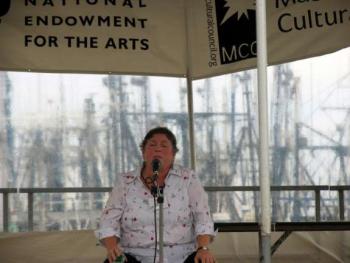Anita Best

The Working Waterfront Festival Community Documentation Project
This project documents the history and culture of the commercial fishing industry and other port trades. The project began in 2004 in conjunction with the Working Waterfront Festival, an annual, educational celebration of commercial fishing culture which takes place in New Bedford, MA. Interviewees have included a wide range of individuals connected to the commercial fishing industry and/or other aspects of the port through work or familial ties. While the majority of interviewees are from the port of New Bedford, the project has also documented numerous individuals from other ports around the country. Folklorist and Festival Director Laura Orleans and Community Scholar and Associate Director Kirsten Bendiksen are project leaders. The original recordings reside at the National Council for the Traditional Arts in Maryland with listening copies housed at the Festival's New Bedford office.
Janice Gadaire Fleuriel
On September 21, 2007, Millie Rahn interviewed Anita Best as part of The Working Waterfront Festival Community Documentation Project. Anita Best grew up in a family deeply connected to the fishing trade. Her father and brothers were fishermen and she discusses the seasonal aspects of fishing, lumbering during Christmas time, and the family-oriented nature of fishing. Anita's family had strong traditions of storytelling, and she recalls watching her father and uncles repair nets, sing songs, and share stories. Anita describes the shift in gender roles in the fishing industry that happened in the late 70s, marked by Vicky Silk’s suit for unemployment. Even though the 70s was a noticeable shift from the past, Anita discusses the ways in which women were always involved in the fishing industry. She describes her love of music and her work with folk-rock band Figgy Duff, where they performed traditional Newfoundland songs with rock elements. When thinking about the traditional canon, Anita notes that it often portrays romantic and soft versions of women, or doesn’t include them at all. She gravitates toward songs about women working and hopes to see more recognition of their contributions. Anita ends by sharing more details about the roles women currently, and historically, had within Newfoundland’s fishing industry.
Please Note: The oral histories in this collection are protected by copyright and have been created for educational, research and personal use as described by the Fair Use Doctrine in the U.S. Copyright law. Please reach out Voices@noaa.gov to let us know how these interviews are being used in your research, project, exhibit, etc. The Voices staff can help provide other useful resources related to your inquiry.
The NOAA mission is to understand and predict changes in climate, weather, oceans, and coasts, to share that knowledge and information with others, and to conserve and manage coastal and marine ecosystems and resources. The Voices Oral History Archives offers public access to a wide range of accounts, including historical materials that are products of their particular times, and may contain offensive language or negative stereotypes.
Voices Oral History Archives does not verify the accuracy of materials submitted to us. The opinions expressed in the interviews are those of the interviewee only. The interviews here have been made available to the public only after the interviewer has confirmed that they have obtained consent.
